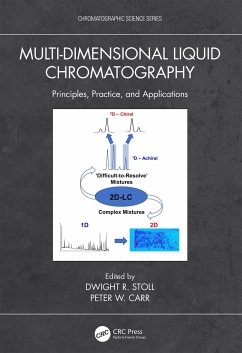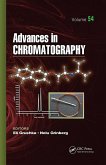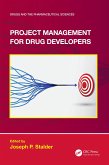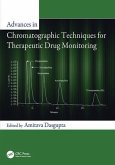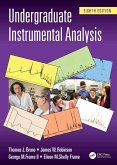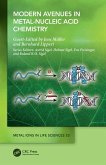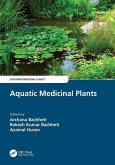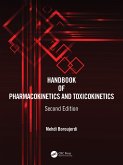Multi-Dimensional Liquid Chromatography
Principles, Practice, and Applications
Herausgeber: Stoll, Dwight R.; Carr, Peter W.
Multi-Dimensional Liquid Chromatography
Principles, Practice, and Applications
Herausgeber: Stoll, Dwight R.; Carr, Peter W.
- Gebundenes Buch
- Merkliste
- Auf die Merkliste
- Bewerten Bewerten
- Teilen
- Produkt teilen
- Produkterinnerung
- Produkterinnerung
Organized by two leaders in the field, this text establishes a sound fundamental basis for the principles of the two-dimensional liquid chromatography technique, followed by a discussion of important practical considerations.
Andere Kunden interessierten sich auch für
![Advances in Chromatography Advances in Chromatography]() Advances in Chromatography54,99 €
Advances in Chromatography54,99 €![Project Management for Drug Developers Project Management for Drug Developers]() Project Management for Drug Developers94,99 €
Project Management for Drug Developers94,99 €![Advances in Chromatographic Techniques for Therapeutic Drug Monitoring Advances in Chromatographic Techniques for Therapeutic Drug Monitoring]() Advances in Chromatographic Techniques for Therapeutic Drug Monitoring85,99 €
Advances in Chromatographic Techniques for Therapeutic Drug Monitoring85,99 €![Undergraduate Instrumental Analysis Undergraduate Instrumental Analysis]() Thomas J. BrunoUndergraduate Instrumental Analysis127,99 €
Thomas J. BrunoUndergraduate Instrumental Analysis127,99 €![Modern Avenues in Metal-Nucleic Acid Chemistry Modern Avenues in Metal-Nucleic Acid Chemistry]() Modern Avenues in Metal-Nucleic Acid Chemistry151,99 €
Modern Avenues in Metal-Nucleic Acid Chemistry151,99 €![Aquatic Medicinal Plants Aquatic Medicinal Plants]() Aquatic Medicinal Plants54,99 €
Aquatic Medicinal Plants54,99 €![Handbook of Pharmacokinetics and Toxicokinetics Handbook of Pharmacokinetics and Toxicokinetics]() Mehdi Boroujerdi ( College of Health Sciences - School of PharmacyHandbook of Pharmacokinetics and Toxicokinetics211,99 €
Mehdi Boroujerdi ( College of Health Sciences - School of PharmacyHandbook of Pharmacokinetics and Toxicokinetics211,99 €-
-
-
Organized by two leaders in the field, this text establishes a sound fundamental basis for the principles of the two-dimensional liquid chromatography technique, followed by a discussion of important practical considerations.
Produktdetails
- Produktdetails
- Chromatographic Science Series
- Verlag: Taylor & Francis Ltd
- Seitenzahl: 390
- Erscheinungstermin: 30. Dezember 2022
- Englisch
- Abmessung: 181mm x 262mm x 26mm
- Gewicht: 948g
- ISBN-13: 9780367547660
- ISBN-10: 036754766X
- Artikelnr.: 65900426
- Chromatographic Science Series
- Verlag: Taylor & Francis Ltd
- Seitenzahl: 390
- Erscheinungstermin: 30. Dezember 2022
- Englisch
- Abmessung: 181mm x 262mm x 26mm
- Gewicht: 948g
- ISBN-13: 9780367547660
- ISBN-10: 036754766X
- Artikelnr.: 65900426
Peter W. Carr received his B.S. in Chemistry (1965) from the Polytechnic Institute of Brooklyn where he worked with Professor Louis Meites and a Ph.D. in Analytical Chemistry at Pennsylvania State University (1969) under the guidance of Professor Joseph Jordan. From 1969 until 1977, he was an Assistant Professor and then Associate Professor of Chemistry at the University of Georgia (Athens). In 1977, He joined the faculty at the University of Minnesota where he became Professor of Chemistry in 1981. He was the founder of ZirChrom Separations Inc. In 1986, he became an Associate Director of the Institute for Advanced Studies in Biological Process Technology at the University of Minnesota. He has received numerous awards including the 1996 ACS Award in Chromatography, the American Chemical Society Award in Analytical Chemistry in 2009, the LCGC Lifetime Achievement Award in 2013, and in 2013 he received the ACS Division of Analytical Chemistry's Award for Excellence in Education. Professor Carr and his nearly 100 former graduate students and postdoctoral associates have published over 400 papers in a variety of areas of Analytical Chemistry including: electrochemistry, ion selective electrodes, thermochemistry, immobilized enzymes, and chromatography. He holds fourteen U.S. patents in areas related to chemical analysis and chromatography. Most recently, his research interests have focused on understanding the nature of solute-solvent interactions as they pertain to the prediction of retention, selectivity and optimization in chromatography. Additional areas of study include affinity chromatography, bio-separations, the theory of nonlinear chromatography, and the development of chemically and thermally stable supports for high performance liquid chromatography (HPLC) and most recently ultra-fast and comprehensive two-dimensional HPLC. Dwight Stoll did his undergraduate work at Minnesota State University, Mankato, in plant biology and biochemistry. From 1999 to 2003 he worked as a research technician with ZirChrom Separations, Inc. For his graduate work he studied with Professor Peter Carr at the University of Minnesota from 2001-2007, where he worked on the development of Fast, Comprehensive Two-Dimensional Liquid Chromatography. In 2008, Dwight joined the Chemistry Department at Gustavus Adolphus College as an assistant professor, and was promoted to Professor in 2018. Since the fall of 2017 he has authored the monthly 'LC Troubleshooting' column for LCGC Magazine. In 2011 he was the recipient of LCGC's Emerging Leader in Chromatography Award, and received young investigator in separation science awards from the American Chemical Society and Eastern Analytical Symposium in 2015 and 2017. He has been named to The Analytical Scientist's lists of top analytical scientists three times, and in 2017 he received the Georges Guiochon Faculty Fellowship. Professor Stoll's active research projects in his laboratory touch upon most aspects of multi-dimensional separation methodologies, including optimization strategies, characterization of selectivity in reversed-phase HPLC, instrument development, and applications in biopharmaceutical analysis. He is the author or co-author of 85 peer-reviewed publications and six book chapters in the area of separation science, speaks internationally on the topic, is a named co-inventor on four patents for separations technologies, and has instructed numerous short courses in two-dimensional liquid chromatography.
1. Introduction to Two-Dimensional Liquid Chromatography. 2. Speed and
Performance in Liquid Chromatography. 3. Theoretical Guiding Principles for
Two-Dimensional Liquid Chromatography. 4. Instrumentation for
Two-Dimensional Liquid Chromatography. 5. Selecting Separation Modes and
Selectivities for Multi-Dimensional LC. 6. Method Development for
Non-Comprehensive Two-Dimensional Liquid Chromatography. 7. Method
Development for Comprehensive Two-Dimensional Liquid Chromatography
Separations. 8. Data Analysis for Multi-Dimensional Liquid Chromatography.
9. Applications of Two-Dimensional Liquid Chromatography for Analysis of
Synthetic Pharmaceutical Materials. 10. Application of Two-Dimensional
Liquid Chromatography to Analysis of Biologics. 11. Applications of
Two-Dimensional Liquid Chromatography to Chemical Analysis in Academic
Research and Industry. 12. Applications of Two-Dimensional Liquid
Chromatography to Natural Product and Food Analysis. 13. Application of
Two-Dimensional Liquid Chromatography to the Analysis of Chiral and
Structurally Similar Molecules.
Performance in Liquid Chromatography. 3. Theoretical Guiding Principles for
Two-Dimensional Liquid Chromatography. 4. Instrumentation for
Two-Dimensional Liquid Chromatography. 5. Selecting Separation Modes and
Selectivities for Multi-Dimensional LC. 6. Method Development for
Non-Comprehensive Two-Dimensional Liquid Chromatography. 7. Method
Development for Comprehensive Two-Dimensional Liquid Chromatography
Separations. 8. Data Analysis for Multi-Dimensional Liquid Chromatography.
9. Applications of Two-Dimensional Liquid Chromatography for Analysis of
Synthetic Pharmaceutical Materials. 10. Application of Two-Dimensional
Liquid Chromatography to Analysis of Biologics. 11. Applications of
Two-Dimensional Liquid Chromatography to Chemical Analysis in Academic
Research and Industry. 12. Applications of Two-Dimensional Liquid
Chromatography to Natural Product and Food Analysis. 13. Application of
Two-Dimensional Liquid Chromatography to the Analysis of Chiral and
Structurally Similar Molecules.
1. Introduction to Two-Dimensional Liquid Chromatography. 2. Speed and
Performance in Liquid Chromatography. 3. Theoretical Guiding Principles for
Two-Dimensional Liquid Chromatography. 4. Instrumentation for
Two-Dimensional Liquid Chromatography. 5. Selecting Separation Modes and
Selectivities for Multi-Dimensional LC. 6. Method Development for
Non-Comprehensive Two-Dimensional Liquid Chromatography. 7. Method
Development for Comprehensive Two-Dimensional Liquid Chromatography
Separations. 8. Data Analysis for Multi-Dimensional Liquid Chromatography.
9. Applications of Two-Dimensional Liquid Chromatography for Analysis of
Synthetic Pharmaceutical Materials. 10. Application of Two-Dimensional
Liquid Chromatography to Analysis of Biologics. 11. Applications of
Two-Dimensional Liquid Chromatography to Chemical Analysis in Academic
Research and Industry. 12. Applications of Two-Dimensional Liquid
Chromatography to Natural Product and Food Analysis. 13. Application of
Two-Dimensional Liquid Chromatography to the Analysis of Chiral and
Structurally Similar Molecules.
Performance in Liquid Chromatography. 3. Theoretical Guiding Principles for
Two-Dimensional Liquid Chromatography. 4. Instrumentation for
Two-Dimensional Liquid Chromatography. 5. Selecting Separation Modes and
Selectivities for Multi-Dimensional LC. 6. Method Development for
Non-Comprehensive Two-Dimensional Liquid Chromatography. 7. Method
Development for Comprehensive Two-Dimensional Liquid Chromatography
Separations. 8. Data Analysis for Multi-Dimensional Liquid Chromatography.
9. Applications of Two-Dimensional Liquid Chromatography for Analysis of
Synthetic Pharmaceutical Materials. 10. Application of Two-Dimensional
Liquid Chromatography to Analysis of Biologics. 11. Applications of
Two-Dimensional Liquid Chromatography to Chemical Analysis in Academic
Research and Industry. 12. Applications of Two-Dimensional Liquid
Chromatography to Natural Product and Food Analysis. 13. Application of
Two-Dimensional Liquid Chromatography to the Analysis of Chiral and
Structurally Similar Molecules.

